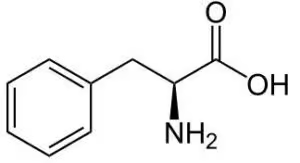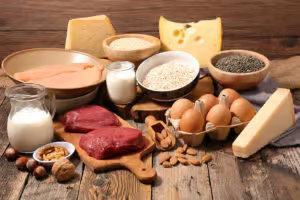Table of Contents
Phenylalanine is a highly bio-available essential amino acid. Your body naturally converts L-Phenylalanine into the amino acid L-Tyrosine which is then converted into L-DOPA. Decarboxylation of L-DOPA results in synthesis of the neurotransmitter dopamine.[i]
Once converted into dopamine, the enzyme dopamine-beta-hydroxylase converts dopamine into the neurotransmitters norepinephrine (noradrenaline) and epinephrine (adrenaline). This triad of neurotransmitters are collectively referred to as “catecholamines”.
As a nootropic supplement, you may find several different forms of Phenylalanine available. L-Phenylalanine is the natural form found in proteins. D-Phenylalanine is a mirror image of L-Phenylalanine that is made in the lab. And DL-Phenylalanine is a combination of the two forms.[ii]
L-Phenylalanine can be a highly effective nootropic for boosting cognitive function because it boosts norepinephrine and dopamine production. Resulting in increased attention, motivation and working memory.
D-Phenylalanine (but not L-Phenylalanine) has been used to treat chronic pain although the clinical research in this area is sparse.
L-Phenylalanine also stimulates the production of thyroid hormones T3 (triiodothyronine) and T4 (thyroxine) which are crucial in maintaining both overall physical and cognitive health.
Phenylalanine helps:
- Cognitive Stress. L-Phenylalanine helps produce the catecholamine-triad of neurotransmitters dopamine, norepinephrine and epinephrine. Sleep deprivation and extreme stressors like heat and cold can deplete catecholamine levels. L-Phenylalanine restores them to preserve optimal cognition.[iii]
- Neurotransmitters. Phenylalanine is a necessary precursor for dopamine, norepinephrine and epinephrine. As your dopamine levels increase, you’re better able to concentrate, organize your thoughts, and stay productive.
- Attention Deficit Disorder (ADHD). L-Phenylalanine can be an effective treatment for some with ADHD symptoms. L-Phenylalanine works in synergy with pharmaceutical drugs like Ritalin and Adderall by boosting extracellular levels of dopamine. Helping these drugs be more effective. And mitigating side effects like crashes when the drug wears off.
Overview
L-Phenylalanine is an essential amino acid that you get from food or a supplement. The enzyme phenylalanine hydroxylase converts Phenylalanine in your liver into the amino acid L-Tyrosine.[iv]

Phenylalanine is found in protein-rich foods like soybeans, cheese, nuts, seeds, beef, lamb, chicken, pork, fish, eggs, dairy, beans, and whole grains. The artificial sweetener aspartame also contains Phenylalanine.
Your brain converts L-Tyrosine to L-DOPA which then produces the neurotransmitter dopamine. The unused dopamine is then further converted into the neurotransmitters norepinephrine (noradrenaline) and epinephrine (adrenaline). This triad of neurotransmitters are collectively referred to as “catecholamines”.
Many neurohackers prefer L-Phenylalanine over other catecholamine precursors because it supports neurotransmitter production without directly increasing neurotransmitter levels.
This last part is key because indiscriminately increasing neurotransmitters across the board can lead to imbalances and tolerance. Which can defeat the purpose of taking the nootropic in the first place.
For example, not enough epinephrine can decrease cognition. And too much norepinephrine can decrease attention, processing speed and executive function.[v]
L-Phenylalanine vs. D-Phenylalanine: What’s the Difference?
L-Phenylalanine is an essential amino acid which means you must get if from food. Or as a supplement. Your body cannot synthesize Phenylalanine on its own.
L-Phenylalanine (LPA) is converted into the amino acid L-Tyrosine in your liver. Once L-Tyrosine crosses the blood-brain barrier, it is converted into L-DOPA. Which is further converted into the neurotransmitters dopamine, norepinephrine (noradrenaline) and epinephrine (adrenaline).
D-Phenylalanine (DPA) is a synthetic version of, and mirror image of L-Phenylalanine created in the lab. DPA has a different mechanism of action in the body than LPA.
D-Phenylalanine (DPA) slows the action of the enzymes carboxypeptidase A or endorphinase and enkephalinase. These enzymes degrade endorphins. Slowing down these enzymes that reduce endorphins can help reduce pain.[vi]
DL-Phenylalanine is a 50/50 combination of L-Phenylalanine and D-Phenylalanine. By combining the two in theory you get the best of both an antidepressant and pain reducer.
How does L-Phenylalanine work in the Brain?
L-Phenylalanine boosts brain health and function in several ways. But two in particular stand out.
- L- Phenylalanine decreases depression. L-Phenylalanine is converted into L-Tyrosine which in turn is converted into L-DOPA in the brain. L-DOPA is then used to make the feel good neurotransmitter dopamine. So depression could be the result of not getting enough of the first amino acid (L-Phenylalanine) in the chain of events needed to produce dopamine.
In one study done in Germany, 20 depressed patients received from 75-200 mg per day of DL-Phenylalanine for 20 days. At the end of the trial 12 of the depressed patients could be discharged without any further treatment. 4 of the patients had a moderate decrease in depressive symptoms. And 4 patients showed no response.[vii]
- L-Phenylalanine boosts neurotransmitters. L-Phenylalanine turns into L-Tyrosine once taken as a supplement. It then converts into the neurotransmitter dopamine. Dopamine is used to control movement in your body, is fundamental to memory, attention and problem solving.
The unused dopamine can then convert into the neurotransmitters norepinephrine (noradrenaline) and epinephrine (adrenaline).
Norepinephrine is important for attentiveness, emotions, sleeping, dreaming and learning.
Epinephrine drives your ‘flight-or-flight’ response. It’s what prompts your reaction to dangerous circumstances, emergency situations, or in stressful situations or environments.
This balance in neurotransmitters is critical to the fully optimized, healthy brain. And why some neurohackers choose L-Phenylalanine to allow the body to make the neurotransmitters it needs. Instead of causing an imbalance by boosting one neurotransmitter over another.
A study in Venezuela investigated ADHD and autism, and the implications of amino acids on these neuropsychiatric disorders. 40 subjects affected by autism and 11 with ADHD along with 41 healthy subjects were included in this study.
The researchers found that those with ADHD had decreasing Phenylalanine and increasing glycine which disrupted their inhibitory neurotransmission system. Not enough phenylalanine and increasing lysine was present in those with autism.[viii]
Another study at Ohio State University looked at amino acids in 28 ADHD patients. And found all subjects with ADHD had significantly lower levels of the amino acids phenylalanine, tyrosine, tryptophan, histidine, and isoleucine. The researchers concluded each subject had a general deficit in amino acid transport, absorption or both.[ix]
How things go bad
As we get older, our brain and body chemistry and energy metabolism changes.
↓ Dopaminergic neurons are damaged or die
↓ Neurotransmitter levels decline
↓ Thyroid hormones decline
↑ Stress levels increase
↓ Working memory and mood decline
All of these changes are often attributed to aging. But could be a result of dietary and lifestyle choices. Unchecked, they could lead to neurodegenerative diseases like Parkinson’s, a drop in quality of life and depression.
L-Phenylalanine benefits
L-Phenylalanine can boost levels of the neurotransmitters dopamine, norepinephrine and epinephrine. And can help a sluggish thyroid produce more T4 and T3.
L-Phenylalanine can help boost cognition especially in stressful situations. It helps improve decision making, ‘flow state’ and creativity, cognitive flexibility, and working memory.
L-Phenylalanine converts into L-Tyrosine which then converts into L-DOPA to produce dopamine. L-DOPA is also used to make melanin in your body. This conversion process helps in the removal of neurotoxic quinones. And chelates heavy metals like mercury and lead which can accumulate in and damage neurons.
The dopamine that is not used by your brain is available to produce norepinephrine (noradrenaline) which is important for attentiveness, emotions, sleeping, dreaming and learning.
L-Phenylalanine may be an effective nootropic when stacked with ADHD/ADD meds like Ritalin or Adderall. It helps supply extracellular dopamine needed to improve the effectiveness of stimulants used to boost the uptake of dopamine in your brain.
How does L-Phenylalanine feel?
Keep in mind that L-Phenylalanine is a precursor to catecholamines. So if you’re not ‘low’ on dopamine, norepinephrine or epinephrine – you may not ‘feel’ anything.
Many neurohackers report a lift in mood, better focus, concentration, increased energy, and an overall sense of well-being. L-Phenylalanine can help readjust your motivation levels. It can help lower anxiety levels, especially social anxiety.
Supplementing with L-Phenylalanine can help bring your blood pressure down if its elevated from a stressful situation or environment. Take it before the stressful event if you can.
L-Phenylalanine helps buffer the effects of stimulants like caffeine or amphetamines. It helps potentiate and prolong the effects of Ritalin or Adderall, and reduces the crash.
If you’re into athletics or do manual work, you’ll find that supplementing with L-Phenylalanine before a workout or construction job can leave you feeling great afterwards. It may help mitigate many of the effects of acute stress caused by short-term stressors.
And L-Phenylalanine helps your body produce L-Tyrosine which helps to produce melanin, so you may find it easier to get a tan while at the beach.
L-Phenylalanine Clinical Research
Phenylalanine as an Antidepressant
Several studies have investigated using Phenylalanine for the treatment of depression. One study published in the journal Arzneimittel-Forschung looked at using DL-Phenylalanine in a small group of patients who failed to respond to popular antidepressants like MAOIs.
In this study, researchers worked with 23 patients diagnosed with depression and who had not responded to standard antidepressants. They were given 50 or 100 mg of Phenylalanine daily for 15 days. The researchers found that Phenylalanine completely improved mood in 17 of the patients. Within 13 days of the 15-day trial.[x]
Another study in the Journal of Neural Transmission studied DL-Phenylalanine use with 20 depressed patients. The subjects were given 75 – 200 mg/day of DL-phenylalanine for 20 days.
The study found that 8 patients completely recovered from depression. And another 4 experienced a significant improvement in mood. Another 4 patients saw mild to moderate improvements, and another 4 did not respond to treatment.
This study shows that Phenylalanine has considerable antidepressant properties. And is effective for the majority of people suffering from depression.[xi]
Phenylalanine for ADHD
Phenylalanine for ADHD seems at first glance as a natural solution for ADHD symptoms. It’s a precursor to the neurotransmitter dopamine which is targeted with stimulants like Ritalin and Adderall. But the very limited clinical evidence tell a different story for practical use.
In this double-blind crossover study, 19 patients with ADD were given DL-phenylalanine or a placebo for 2 weeks. 13 of the ADD patients experienced a significant improvement in ADD symptoms compared to the placebo. And patients saw an improvement in mood.
But the patients who did respond to DL-Phenylalanine lost all positive benefits within 3 months. And it’s interesting that a later study with ADHD patients using L-phenylalanine (not DL-Phenylalanine) produced no clinical benefit.[xii]
Another study from 1987 treated 11 hyperactive boys for 2 weeks with D-Phenylalanine. There was no significant improvement or deterioration in behavior.[xiii]
There is a modern school of thought that there are several different types of ADD and ADHD. And the symptoms are caused by malfunctions in different parts of the brain depending on the ‘type’ of ADHD.
The bottom line is some dealing with ADHD may benefit from supplementing with Phenylalanine. And that DL-Phenylalanine may be the best option. Try it and see if it works for you.
L-Phenylalanine Recommended Dosage
 L-Phenylalanine suggested dosage for cognitive benefit is 500 mg up to 3-times per day.
L-Phenylalanine suggested dosage for cognitive benefit is 500 mg up to 3-times per day.
You may find your body responds to smaller doses. Or even more if your stacking it with stimulants like ADHD meds. Listen to your body and see how you react.
Since L-Phenylalanine is an amino acid, for best absorption and so it’s not competing with other amino acids, take it at least an hour before food. L-Phenylalanine works best on an empty stomach.
And take L-Phenylalanine with Vitamin B6 and Vitamin C to further maximize absorption. And give your body what it needs to produce the neurotransmitters dopamine, norepinephrine and epinephrine.
L-Phenylalanine is also needed along with L-Tyrosine to synthesize the CoQ10 needed to create fuel within your brain’s mitochondria.
L-Phenylalanine Side Effects
L-Phenylalanine quickly turns into the non-essential amino acid L-Tyrosine once you take it. So is considered non-toxic and very safe. Most neurohackers don’t have any negative side effects.
Important Caution: People with phenylketonuria (PKU), and women who are breastfeeding or are pregnant, should not take phenylalanine supplements. PKU is an inherited condition where excess phenylalanine can build up in your body. Aspartame, found in artificial sweeteners such as NutraSweet, is a source of phenylalanine. People with PKU should not use aspartame. If you are pregnant, ask your doctor about using this artificial sweetener.[xiv]
At higher doses there are reports of stomach issues and migraines. Experts say that L-Phenylalanine is toxic in doses above 5000 mg. And higher doses will not give you any added benefit.
If you try recommended doses of L-Phenylalanine and do not feel any benefit, then this nootropic may not be right for you. You could try L-Tyrosine or NALT instead.
L-Phenylalanine can increase your thyroid hormones. So if you’re hyperthyroid you shouldn’t use L-Phenylalanine.
And if you’re taking MAO inhibitors (MAOI’s) like selegiline, Azilect, Marplan or Nardil you should not use L-Phenylalanine. MAOI’s work in your brain and affect neurotransmitters. So using L-Phenylalanine in combination with MAOI’s could throw off the delicate balance of neurotransmitters needed for optimal brain health and cognition. And taking L-Phenylalanine with MAOI’s could cause a severe increase in blood pressure which could lead to a heart attack or stroke.
Other sides effects which can accompany unusually high doses of phenylalanine can include anxiety, rapid heart beat, restlessness, heart palpitations or high blood pressure. If you are dealing with or on medication for high blood pressure you should not use L-Phenylalanine.
Type of Phenylalanine to buy
L-Phenylalanine is available in powder, capsule and tablet form. Capsules and tablets are usually 500 mg.
Phenylalanine is also available as D-Phenylalanine and the 50/50 combined form of DL-Phenylalanine. You may find one form works better for you than another.
Ensure you read labels carefully, and stick with manufacturers who follow Good Manufacturing Practices (GMP). And are GMP-Certified.
Nootropics Expert Recommendation
L-Phenylalanine 500 mg up to 3-times per day
 I recommend using L-Phenylalanine as a nootropic supplement.
I recommend using L-Phenylalanine as a nootropic supplement.
Your body does synthesize some L-Tyrosine from phenylalanine which comes from high-protein foods like chicken, fish, almonds, avocados and bananas.
But most of us don’t get enough L-Phenylalanine from our diet. So supplementation will help. And L-Phenylalanine is a highly bioavailable, natural form of this amino acid. So you should feel its effects faster.
L-Phenylalanine is helpful for most neurohackers to combat stress and sleep deprivation. It’ll boost dopamine, norepinephrine and epinephrine levels.
It’s particularly helpful if you take L-Phenylalanine prior to a stressful situation, workout or physically demanding job.
L-Phenylalanine could be helpful to those dealing with ADHD/ADD. It’s a great compliment to stack with stimulant meds like Ritalin or Adderall. L-Phenylalanine will provide the dopamine your brain needs. It will help smooth out and prolong the effects of stimulant meds. And help prevent the associated crash when they wear off.
You can safely use up to 1,500 mg per day when stacking with ADHD meds. But dosed throughout your day.








Join The Discussion - 141 comments
Manny
February 22, 2024
Hi David,
Curious on your thoughts.
If my bloodwork show sufficient levels of Tyrosine but slightly insufficient levels of Phenylalanine, yet L-Phenylalanine converts into L-Tyrosine which then converts into L-DOPA to produce dopamine, then I’m wondering how i have sufficient Tyrosine levels if I’m testing low on phenylalanine? what would be the benefit of taking it for anxiety , bad mood etc . Am i missing something ?
Thanks a lot for all your nootropic work you’ve done.
David Tomen
February 22, 2024
Manny, in my opinion it is a waste of time and money to test any neurotransmitter. Because the levels for example of Tyrosine or dopamine in your blood or urine tell you nothing about how much is in your brain. Which is were it counts when it comes to cognition.
Supplementing with L-Tyrosine 500 mg twice per day will tell you if you need more dopamine or not. it is safe to test. And you may find a huge improvement. Or not.
Manny
February 23, 2024
Thanks for the quick response! much appreciate, and I’ll give it try.
Manny
February 23, 2024
PS- it tried GABA at night and it was wired and it kept me up all night. I’m wondering if it simply NOT what was missing, or it was missing another substance to get it into the brain to use. maybe i combine it with something else, or go backwards a little give give solo L-Tyrosine a shot first.
I wake up and the mind is lost to rapid thoughts i cant control.
David Tomen
February 28, 2024
Manny, it sounds like GABA is the wrong supplement for you.
Jack Etra
November 13, 2023
Hi David,
If i take it long term do you think that the effects will diminish so I will have to cycle it with a different dophamine booster such as Tyrosine?
Also do I have to balance the seratonine through taking Tryptophan?
Can I take it together with a small dose of SJW?
David Tomen
November 15, 2023
Jack, it depends on if you are how on dopamine to start with. Dopamine declines by 10% per decade starting in your early 20’s. So if you need the dopamine you do not need to “cycle” Phenylalanine. Most find that L-Tyrosine works better to increase dopamine however. It is only two steps away from producing dopamine.
And if you are increasing dopamine you also need to support serotonin. Otherwise it’ll deplete serotonin. Best to use L-Tryptophan before bed and Tyrosine twice during the day.
There is no reason to use St. John’s wort unless you are dealing with depression.
M
July 27, 2023
Hello David! Which brand is the best for L-Phenylalanin only . Thanks
David Tomen
July 31, 2023
https://geni.us/gAAvhSI
Val
May 6, 2023
A couple of years back, I went straight to L-tyrosine as an additive to vyvanse, in order to keep the dosage low and prevent crashes. I thought L-phenyalanine would be reduntant, as it is higher up in the amino acid chain. I’ve never felt a strong direct effect of L-tyrosine, and adding more of it doesn’t seem to have an effect. However, it has an indirect effect, as low doses of vyvanse are ineffective without it. Now, I’ve been testing L-phenylalanine for a couple of weeks, and surprise surprise: it seems to be more effect than L-tyrosine. It seems to have a direct effect, in that too much of it induces a hectic state, and I’ve been able to lower my vyvanse dose even more.
Thing is I can’t think of why this would be the case. Perhaps, this is just subjective. But would there be any scientific explanation why L-phenylalanin would be more effective than L-Tyrosine?
David Tomen
May 6, 2023
Val, thanks for your report. The only thing I can think of is problems with certain enzymes for why you seem to respond better to Phenylalanine.
Val Antonsson
June 18, 2023
Hi David,
On further experience, I can not reccomend phenylalanine. It seems to raise blood pressure, and although there’s a subjective sense of greater drive, it does not translate into better focus, neither sustained or flexible focus, or better motivation. So, I’m back to tyrosine.
Vytautas
April 12, 2023
Hello David,
Can you take Phenylalanine with Cysteine together safely? Thank you.
David Tomen
April 18, 2023
Yes
Vytautas
April 24, 2023
Also, I use Concerta for adhd. I was wondering which nootropics would be best to try to minimize crashes and which would at least somewhat preserve my brain from potential damage since it’s being constantly stimulated. Thanks.
David Tomen
April 26, 2023
See the yellow box near the top of this article: https://nootropicsexpert.com/best-nootropics-for-adhd-add/. Following that protocol including the supplements taken at 4 PM will help prevent the crash.
Vytas
March 31, 2023
Hello, David
Much thanks for your content, I find it very useful and so do a lot of other people I’m sure. I asked you this question already, but either you didn’t answer it or I forgot on which post I posted it (there are sure a lot of them!). Anyways, I was curious as to find out your thoughts on alcohol, do you drink at all and why/why not? Thanks a lot!
David Tomen
March 31, 2023
Vytas, I haven’t had a drink of alcohol for many years because when I decided to get healthy that included doing my best to avoid toxins. And alcohol is toxic to the human brain.
Vytas
April 5, 2023
Right. What nootropics could you recommend for social situations which usually involve drinking alcohol to kind of replace it? I recall Aniracetam as one of the options, but I have trouble accessing it in my country. Maybe there would be some alternatives to it? Thanks again for your time answering!
David Tomen
April 9, 2023
There is no direct substitute for alcohol in supplement form. You could try one of the apoptogenic herbs (https://nootropicsexpert.com/top-7-nootropic-adaptogens-to-conquer-anxiety-and-stress/). But I highly doubt you’ll find anything to replace alcohol.
Casilinum
March 23, 2023
If one wanted to cycle DLPA and Tyrosine on a 5/2, or similar, schedule, would you happen to know the dosage equivalency?
I’ve searched but haven’t been able to locate relevant data. I’m currently taking 1.5g of Tyrosine daily and would like to see what, if any, effect cycling it with DLPA would have.
David Tomen
March 28, 2023
There is no data on dosage equivalency between these two precursors. But the recommended dosage for each is 500 mg 2 or 3-times per day.
Daniel
January 14, 2023
Is it safe to take with Rhodiola Rosea?
David Tomen
January 18, 2023
Daniel, it’s safe. Rhodiola Rosea will just potentiate the effectiveness of Phenylalanine.